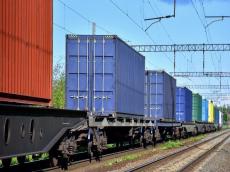|
|
TODAY.AZ / World news
Lithuania can become cargo transit gateway for Turkmenistan’s business to Europe – ministry
04 November 2021 [12:30] - TODAY.AZ

By Trend
Due to the benefits the Lithuanian transport and logistics infrastructure can offer, Lithuania could become a cargo transit gateway for Turkmenistan’s business to Europe, the Ministry of Transport and Communications of Lithuania told Trend.
According to the ministry, Lithuania and Turkmenistan have room for closer cooperation in transport and logistics.
“Due to its favorable geographical position, Lithuania has easy and rapid access to three important markets: the Baltic Sea Region, the European Union (EU), and the Commonwealth of Independent States (CIS). Also, Lithuania offers a well-functioning multimodal transport system of railway, maritime, road, and air transport connections,” the ministry noted.
An interoperable transport network of two railway gauges – broad-gauge (1520 millimeters) and standard-gauge (1435 millimeters), and 30 min for border crossing formalities at the EU and CIS border with simplified administrative procedures of railway cargo documentation are our competitive advantages.
In addition, railway transport in Lithuania provides efficient long-distance cargo services. Two multimodal terminals in the biggest Lithuanian cities of Vilnius and Kaunas are the hubs for road and railway transport interoperability, which provide free capacities for cargo reloading/uploading for further distribution in the region.
“Lithuania can perfectly serve as a reliable transit country for the Turkmen cargo transported to/from Scandinavia, and the JSC Lithuanian Railways is able to ensure the high-quality maintenance and transportation of Turkmen cargo flows using the “Viking Train” and TRACECA corridors,” the ministry stressed.
The ministry also added that in the broader context of the EU Green Deal policy, semi-trailer transportation by Lithuanian rail opens up additional opportunities to expand sustainable and innovative economic activities.
“Warehousing services in the logistics centers have more than nine million square foot facilities. They can fully satisfy the purpose of the Turkmen’s cargo consolidation and deconsolidation for further transportation by railway to Western Europe or to Asia or by the fast-developing international road transport sector in the region,” the message said.
Moreover, Lithuanian road transport companies have over 50,000 vehicles truck fleet exporting their transportation services to the European Union and CIS markets.
“We are able to offer efficient door-to-door or last-mile solutions by the road transport and reach any place in Europe in just three days. It perfectly fits with the e-commerce shipment philosophy – the parcel can be delivered to the customer in 72 hours,” the ministry said.
Furthermore, the ministry said that free economic zones (FEZ) or industrial centers in Lithuania also offer great possibilities for investors and companies from Turkmenistan willing to establish their hubs as the gateways for their products to the EU and CIS markets.
It is reported that seven FEZs located in Lithuania are prepared for business use and have the entire necessary physical (electricity, gas, sewerage, roads, etc.) and legal infrastructure, support service, and tax incentives.
“Considering the fact, that more than 90 percent of Eurasian cargo is shipped by sea, we offer Turkmenistan’s companies to use the Port of Klaipeda and a well-functioning multimodal transport system as the transit or cargo consolidation and deconsolidation hub to the Northern and Eastern Europe region,” the ministry emphasized.
“Due to the benefits the Lithuanian transport and logistics infrastructure can offer, Lithuania could become a cargo transit gateway for Turkmenistan’s business to Europe. We will work harder to actualize this potential cooperation with Turkmenistan and other countries in the region,” the ministry summed up.
URL: http://www.today.az/news/regions/211704.html
 Print version
Print version
Connect with us. Get latest news and updates.
See Also
- 19 November 2024 [18:41]
London and New Delhi resume free trade talks - 19 November 2024 [11:34]
Bulgaria's BTA, Egypt's national agency MENA sign news exchange deal - 19 November 2024 [09:00]
Vietnam and Brazil raised level of relations to strategic partnership - 18 November 2024 [23:50]
North Korea launched garbage balloons into South Korea again - 18 November 2024 [22:27]
Milan topped list of most comfortable cities in Italy - 18 November 2024 [21:22]
US nuclear submarine entered the port of South Korea to replenish supplies - 18 November 2024 [20:18]
Finland raises defense spending to required NATO level - 18 November 2024 [13:23]
Pashinyan confirms high-profile resignations in Armenian government - 17 November 2024 [23:21]
Taiwan Foreign Minister leads drone tech delegation to Lithuania - 17 November 2024 [22:27]
Xi Jinping seeks stable US-China relations ahead of Trump’s return to office
Most Popular
 Azerbaijan and COP29: a real approach and an example for everyone
Azerbaijan and COP29: a real approach and an example for everyone
 Azerbaijani activists protest U.S. Congressman Frank Pallone, demand apology and legal action
Azerbaijani activists protest U.S. Congressman Frank Pallone, demand apology and legal action
 Pro-Armenian Pallone's appearance in Baku and test of Azerbaijan’s peaceful diplomacy
Pro-Armenian Pallone's appearance in Baku and test of Azerbaijan’s peaceful diplomacy
 COP29 panel explores role of SMEs in green economy transition
COP29 panel explores role of SMEs in green economy transition
 USA, South Korea & Japan strengthen their missile defense capabilities
USA, South Korea & Japan strengthen their missile defense capabilities
 Xi Jinping seeks stable US-China relations ahead of Trump’s return to office
Xi Jinping seeks stable US-China relations ahead of Trump’s return to office
 Turkish Foreign Ministry congratulates Azerbaijan on National Revival Day
Turkish Foreign Ministry congratulates Azerbaijan on National Revival Day
